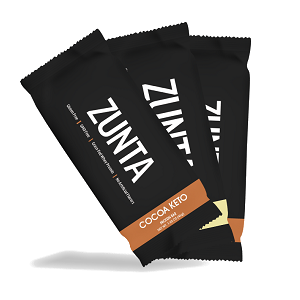Ed Jones was Fed Up with Inferior Protein Bars, So He Formulated This One…
Nutrition World > Blog >
It’s nearly impossible for most folks to eat all their meals at home. Between work, errands, taking kids to practices and other obligations, hunger will inevitably hit at some point while you are on the road and away from your kitchen. If you’re trying to be healthier, lose weight or avoid processed foods, options for easing the hunger pains can be slim to nil when it comes to the bright lights of drive-thrus or gas stations.
This is why I recommend that you carry a box of protein bars in your car, purse, backpack or diaper bag at all times. Protein bars are a clean snack and/or meal replacement, which we all need at some point in the busy world we operate in. Besides the health aspects, they are more economical and time-saving than seeking out a healthy option anywhere else on the road.
Protein bars may have a bad rap for some folks who might still view them as the “granola bars” of decades ago, whose intent was simply to provide a source of healthy calories for anyone needing quick fuel and nutrition. Although there are bad apples in the mix of protein bar options (more on that below), the nutrition science and incredible formulas behind the protein bars on the market now make it almost overwhelming to choose one.
Protein is filling, it gives you energy, and it's essential to a healthy lifestyle. It's nearly impossible to lose weight, have the necessary energy to complete your tasks and/or make it through your day without protein. Share on XBut, as with most products, protein bars are not created equal, and the diligent consumer will need to do some market research before committing to a brand of protein bar.
The most important things you want in a bar are a clean protein source of at least 10 grams, net carbs less than 10 grams, fiber greater than 7 grams and healthy fats, plus labels that assure you the product is non-GMO, gluten-free and soy-free.
What you don’t want in a protein bar are as follows: GMO ingredients, soy, peanuts (they contain a fungus from the growing process), high-fructose corn syrup, refined sugar and artificial ingredients. Any good the protein could do for your body is negated by the presence of these ingredients.
Some folks prefer protein drinks to bars, but I try to steer them away from that choice. High-level, quality protein bars tend to have cleaner ingredients than most prepackaged protein drinks. Manufacturers add lots of additional ingredients to protein drinks for preservation and taste. It isn’t impossible to find a good choice for a protein drink, but you would need to vet your choices the same as you would for a bar, and it may be more difficult to find what you are looking for.
Choosing which protein bar is right for you can be as complex as choosing a new computer. The first thing to do would be to determine the ingredients that best agree with your body, as well as when you will be eating the bar, the preferred ratio of fat to protein to carbs, and of course taste. I recommend asking an expert to help you make the choice if you feel overwhelmed.




